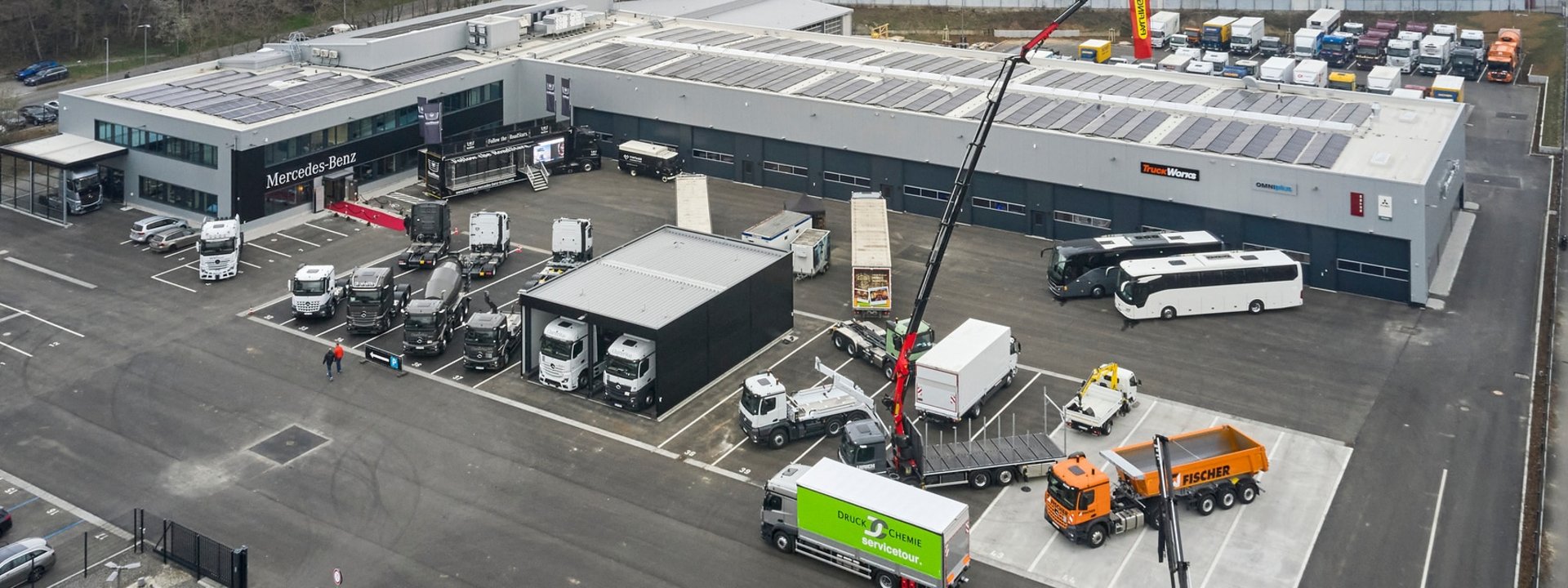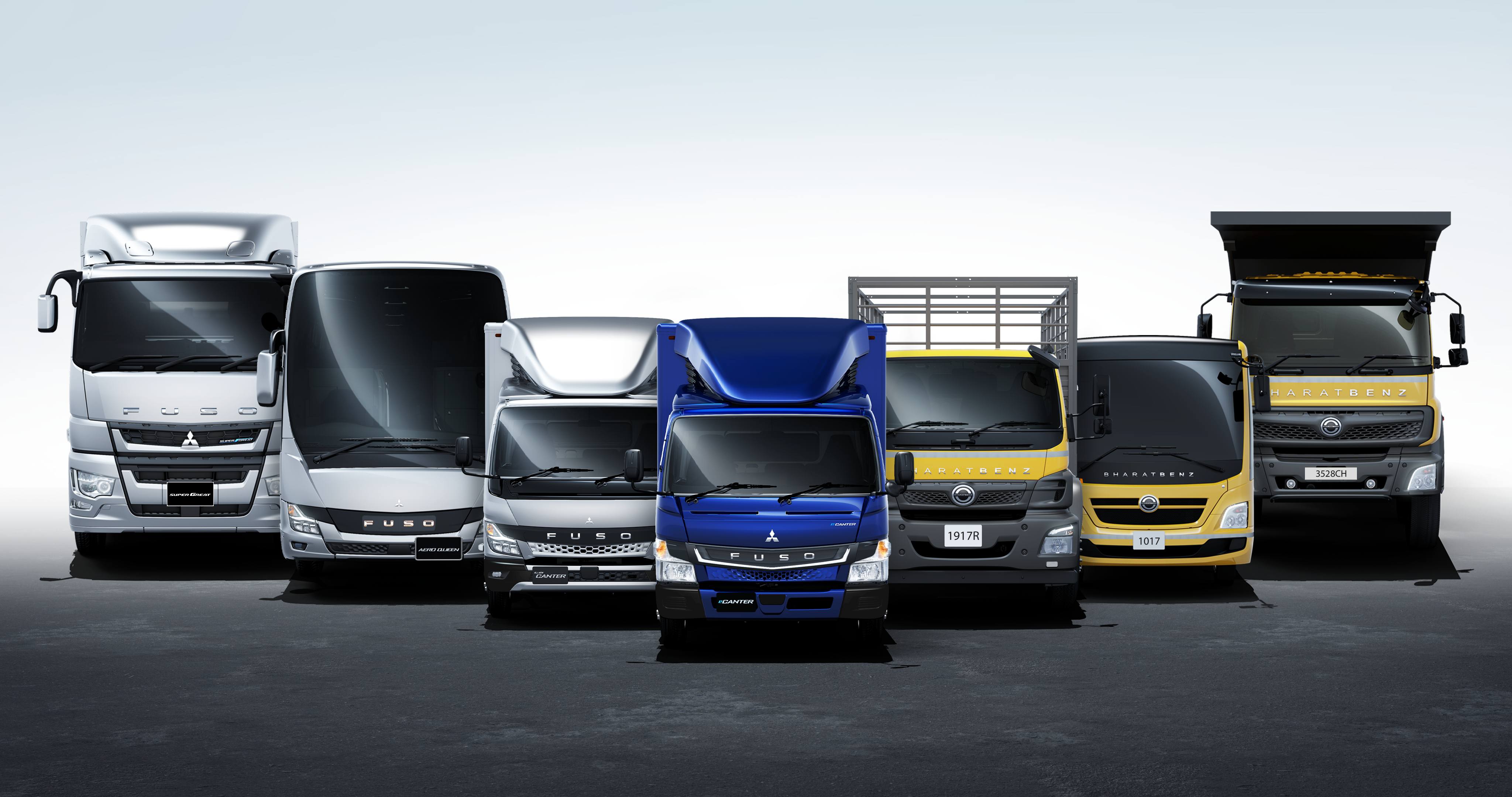Daimler's Big Move: eCanter to Hit Indian Roads, Fueling BEV and Hydrogen Future in Trucking
CHENNAI: Daimler India Commercial Vehicles (DICV) is set to be the next player in the emerging electric truck market, with the eCanter, an electric light duty truck from Mitsubishi Fuso, also owned by Daimler Truck. The e-truck, which will also mark DICV's entry into the light commercial vehicle (LCV) segment in India, will be launched in the market in the next 6 to 12 months.
The eCanter will be assembled in India and sold under the BharatBenz brand. The e-truck is powered by an LFP battery, which can also be charged with an AC charger, and has variants in the gross vehicle weight range from 3.5 to 7.5 tons. The launch of eCanter “is the first step in our long-term strategy to decarbonize our entire product portfolio,” Satyakam Arya, DICV’s MD & CEO said.
The eCanter, currently in its 3rd generation launched last year in Japan, has sold 2,500 units since the first generation model debuted in 2017. The eCanter for India is undergoing advanced testing at DICV, ahead of customer trial capabilities. The eCanter has been sold by the hundreds in Europe, Australia, New Zealand and Hong Kong. Taiwan, Turkey and the Middle East will soon be added as markets for the electric truck. Daimler Truck plans to have a “significant presence in major markets around the world with a hundred variants.”
DICV says India’s CO2-neutral propulsion technology market in India is still in its infancy and therefore has tremendous scope in the long term. In the long term, Daimler Truck sees only battery electric vehicles (BEV) and hydrogen (fuel cells and ICE) as leading technologies in the global road transport industry. There will also be a technological shift in India's diesel-dominated truck market, but this is expected to happen gradually.
At DICV, diesel is considered to have a majority share in the domestic road transport industry until 2047, the target year for India to become energy independent. Currently, 96% of Indian trucks run on diesel, the rest on CNG and battery electric vehicles in a small percentage. DICV considers BEVs to be most suitable for the urban and regional distribution truck segment, where daily mileage clocked is around 600 km.
The company's CO2-neutral propulsion technology roadmap is being prepared in line with Daimler Truck’s global technology strategy with battery electric and hydrogen-based drive technologies. DICV has already developed a hydrogen fuel cell concept bus from BharatBenz in collaboration with Reliance Industries. Going forward, DICV says it will offer the trucks in various utility segments providing long haul, mining, construction, POL, dump trucks, RMC and other services for various cargo and terrain requirements.

LNG, a ‘tactical’ play
After CNG, CV OEMs also offer LNG trucks, but DICVs may only have a “tactical play” in this segment. “We will commit primarily to battery-electric and hydrogen-based propulsion technologies across our future product portfolio, in a phased manner. One thing is certain, we will be ready with the right vehicles where the market is,” Arya said.
Dr. Andreas Gorbach, Member of the Board of Management and Head of Global Truck Technology at Daimler Truck, said that the global giant deliberately avoided gaseous fuels in its “Power to Drive” technology strategy because they “do not contribute to decarbonization”. “Yes, there is less carbon in the fuel, but the fuel efficiency is also less,” he said. But it merits investing in building the requisite infrastructure for EVs and Hydrogen, rather than for interim solutions like CNG or LNG,” he added.
DICV’s tactical play for LNG could include collaboration with a partner. “We will bring an LNG solution to the market if we see the infrastructure developing and customers demand it,” Arya said.

India, a major base for Daimler
For Daimler Trucks, India is a growing market as it clocked a 39% YoY growth in truck and bus sales and 21% growth in revenue last year. It has not yet managed to reach the podium in the Indian CV industry, but India is already an important base for engineering and technology development for Daimler Truck.
Daimler Truck Innovation Center India, the global technical center for CV Master, is supporting the softwarisation of products across Daimler-owned brands. One of the important projects is the first Daimler OS (operating system). Dr. Gorbach said the operating system is expected to be deployed on Daimler trucks later this decade or early next year.
At DICV, around 200 out of the 500+ engineers are dedicated for the Mitsubishi Fuso projects. This could also help DICV with its eCanter localization efforts.
Also as part of the overall strategy, India is a "very important base" for Daimler Truck. “This is because we have the capabilities here, we have an excellent investment environment, we have an excellent team here, skilled engineers, we have a strong network,” said Karl Dibben, Board of Directors of Daimler Truck Holding AG, “so we have a very strong production line and we have brought it to the world because We export a significant portion of our products using different brands in different markets around the world.”
Carbon neutrality targets
Daimler Truck plans to make its new trucks and buses CO2 neutral in Europe, Japan and the United States by 2039, and globally by 2050. DICV aims to achieve carbon neutrality in its value chain by 2047. Its goal is to power its plant for 100 people. % renewable energy by next year, up from 84% last year.
At the CV industry level, DICV expects diesel ICE and CO2 neutral diesel propulsion technologies to coexist in the Indian market for the foreseeable future. Charging and refueling infrastructure, availability of green energy, cost parity and wider customer acceptance are some of the key factors on which the long-term plans of OEMs like DICV depend.
Therefore, DICV says its initial focus with eCanter is “to achieve product and service excellence, along with customer acceptance.”
“Over the next two decades, we will have a firm footing with decarbonised transportation solutions and will be making progress towards becoming a leader in sustainable transportation in India,” Arya said.
Electric buses also play a role, he said. Through its multiple CO2 neutral propulsion technology projects, DICV hopes to contribute to India's journey towards becoming one of the top five commercial vehicle markets in the world, Arya added.
Also Read: Aprilia RSV4, RS660, Tuono 660 and Tuareg 660 launched in India